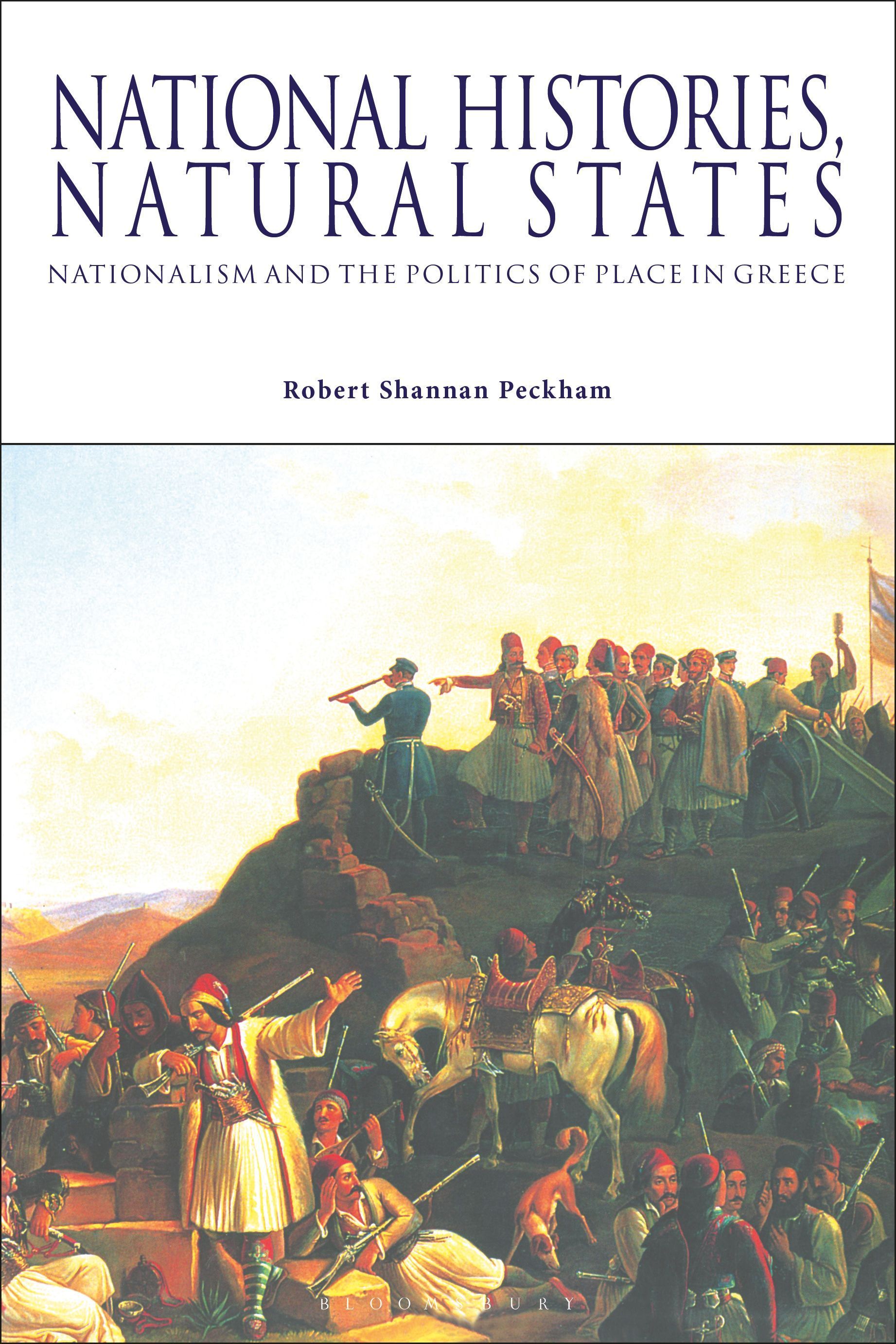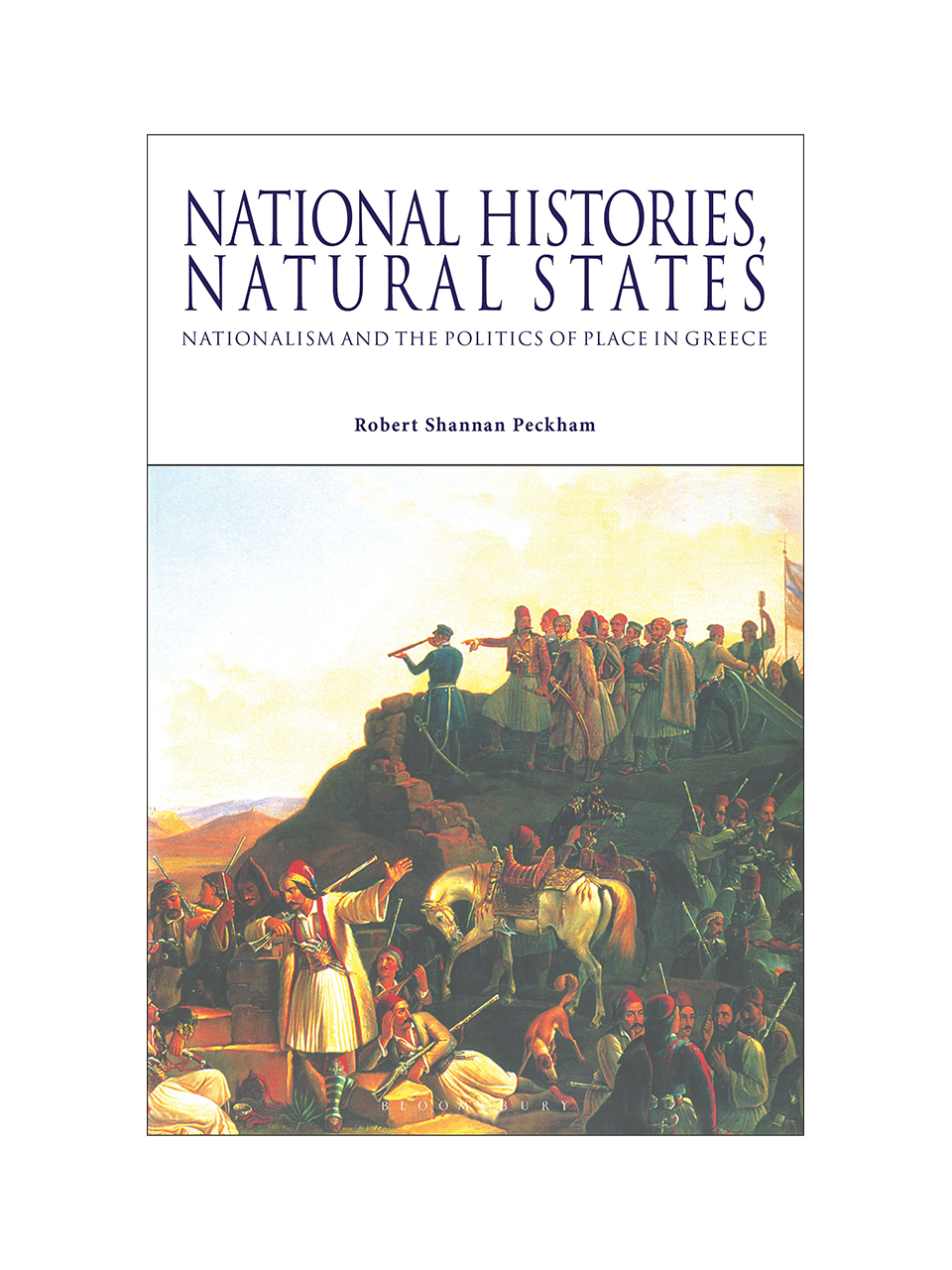
National History, Natural States
Published by I. B. Tauris in August 2001; paperback by Bloomsbury in September 2020; Greek translation by Enalios in March 2008.
An important study on nationalism and nation-building, with urgent implications for the present.
Conflicts in southeast Europe during the 1990s drew attention to the close relationship between place and national identity. Robert Peckham here explores the conscious linkage between identity and homeland as this was articulated in nineteenth and early-twentieth-century Greece, a period important to the understanding of the late twentieth-century Balkan crisis. He demonstrates how territory was appropriated through a range of social practices and institutional activities: writing fiction, identifying folklore, sponsoring archaeology, studying geography and cartography. The particularities of place, Peckham argues, were construed both as underpinning a territorial expansion and as a resistance to the homogenizing drive of a state-sponsored nationalism. This book makes an innovative theoretical contribution to the debate on nationalism and nationhood and suggests new ways of thinking about geography and cultural politics.
THINGS PEOPLE ARE SAYING
ABOUT THIS BOOK:
“In this thoughtful, well-written and wide-ranging analysis, Peckham shows how the disciplines of geography, cartography, history, archaeology, ethnographic fiction, and folklore were all harnessed to the cause of creating an all-encompassing sense of Greek identity in the new kingdom… At a time when rampant nationalism has had, and continues to have, such a destructive effect on the Balkans, this book is particularly relevant.”
Richard Clogg, Emeritus Fellow, St. Anthony’s College, University of Oxford, Times Literary Supplement (2002), author ― A Concise History of Greece.
“Although nations are impossible to conceive without reference to a territory, there is only a limited number of studies focusing on the territorial aspect of nationalist ideology... Peckham’s work can be primarily classified under cultural geography, but his approach is clearly interdisciplinary and addresses issues widely discussed in history, cultural studies and literature. Peckham’s interdisciplinary and impressively documented approach allows him to situate these arguments in a wider comparative context... This book is an important and original contribution both to the study of Greek nationalism and to wider debates about nationhood and nationalism.”
Nations and Nationalism (2002).
“... [a] daring and thoughtful book, which will be of interest to students and scholars in the humanities and social sciences.”
History: Reviews of New Books (2002).
“Among the many historically connected issues that resurfaced during the 1990s in the former Yugoslavia, those of geographical borders and conflicting national claims assumed particular significance. Anyone acquainted even remotely with Southeastern Europe is familiar with their volatile dimensions. Robert Peckham has accordingly produced a timely interdisciplinary case study that focuses on Greece for an exposition of nationhood, nationalism, and geographical imagination in the nineteenth and early twentieth centuries...Theoretically based, this insightful study with its emphasis on the relationship between land and nation offers a creative critique of the trajectory of Greek nationalism.”
American Historical Review (2003).
“This book cuts a swathe through two hundred years of Greek exceptionalism. With firmness and sensitivity, Robert Peckham lays bare the processes by which ‘Modern’ Greece came to identify itself, and to be accepted, as the direct inheritor of an ancient civilization. In National Histories, Natural States the construction of Greek identity between the 1780s and the 1920s is shown to be an inextricable part of the historical process that saw the terminal decline of the Ottoman Empire and the foundation of the modern Balkan nation-states. Peckham ranges with confidence across the disciplines of history, cultural studies, geography, archaeology and literature to place Greek practice in each of these in close relation to cognate practices culled form British, French, German, Italian, Spanish and Russian sources. In an entirely new ways, National Histories, Natural States puts Modern Greece, and Modern Greek Studies, ‘on the map.’”
Sir Roderick Beaton, Emeritus Koraes Professor of Modern Greek and Byzantine History, Language and Literature, King’s College London – author, The Greeks: A Global History and Greece: Biography of a Modern Nation.
“Demonstrating how nations are continuing projects rather than natural human groupings has been central to recent scholarship in cultural and political studies. Reworking geography as territory, and proclaiming the naturalness of national space, are crucial parts of such projects. Greece’s nineteenth-century geographical self-invention too place in the context of the Greeks’ supposed foundational role in European civilization and of enormously complex local and regional cultural histories. Robert Peckham reveals the vital role played by geography – as material space and as intellectual activity – in Greece’s self-making. Written with elegance and a sure grasp of an impressive range of sources, Natural Histories, Natural States is a significant substantive work of cultural geography and a timely contribution to our understanding of the geopolitics of Southeastern Europe.”
Denis E. Cosgrove, Alexander von Humboldt Professor of Geography, University of California, Los Angeles – author, Apollo’s Eye: A Cartographic Genealogy of the Earth in the Western Imagination.

